My friend Anna has a wonderful, unusual garden.
And practically everything in it has been swapped or acquired for free.
Swapping and recycling doesn’t just save you money. You’ll end up with an unusual garden – with lots of personality and stories to tell. And it helps improve gardening’s environmental impact, too.
So I asked Anna for her top tips on how to find great garden swaps and freebies.

Anna got shop mannequins (for free) via Freegle and they work as sculpture in her garden. The plant is an exceptionally long-flowering mallow bought at a plant fair.
You don’t need it to be labelled ‘garden’
Anna’s garden is full of things she’s sourced from all sorts of places. Recently she’s added several shop mannequins from Freegle (a giveaway/recycling site), used as statuary and planters.
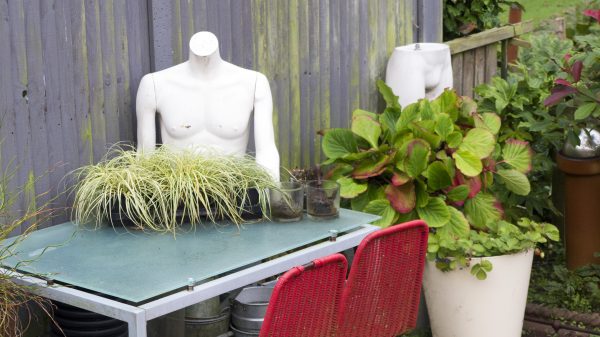
Two of the Freegle mannequins. He’s waiting to have his neck cut off so his hollow body can be used as a planter. The table was picked up very cheaply as it was left over at the end of an auction. It was probably an office table.
And she’s sourced tractor tyres from a farm, as well as car tyres from several garages.

Anna’s garden is a long thin garden behind a 20th century row of terraced houses. However, it’s unusual in that the ground is very damp, and the garden stretches out into woodland. Each garden owns its own strip of woodland, but there is no fencing so the wood itself is open.
The path is made of car tyres (free)
‘It costs garages to get rid of tyres,’ says Anna. ‘So you can usually persuade them to drop them off for free.’
Anna’s terraced house backs onto a stream, a boggy area and a wood. It was originally part of Faversham’s gunpowder works and the trees were coppiced alders used to make charcoal for the works.
So, although we’re in Kent, it’s very damp ground. Anna got a whole load of free car tyres, then paid landscapers to set them into her garden as a path.
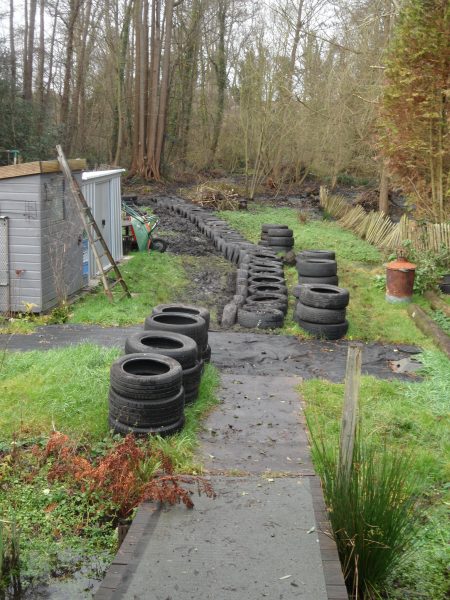
Anna’s path two years ago, just as the path was being made.
They are wedged into the soil upright (ie at the same angle as they would be when on a car) on either side of the path. There’s a middle tyre lying on its side between the two sides to make the main walkway of the path. It’s been infilled with soil, and is now covered in grass.
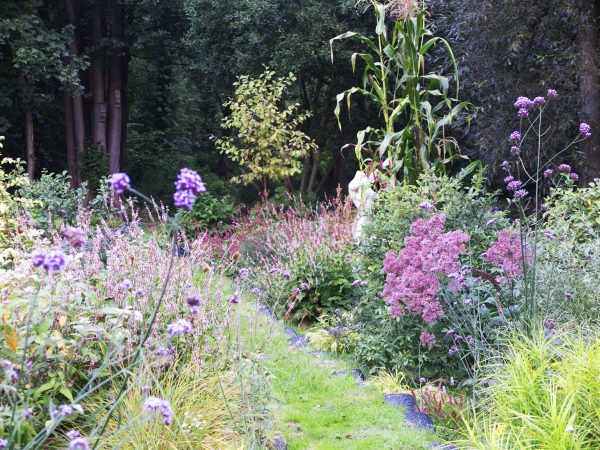
The car tyre path now covered with grass.
Put the word about
About ten years ago, Anna noticed that people were buying tree ferns but didn’t really know how to look after them. So there were alot of dead tree fern stumps scattered about. ‘I asked around, and collected them,’ she said.
Now, of course, we have Facebook, Twitter and more if we want to find or get rid of things. In those days, it was just about keeping an ear open. It’s still worth doing the old-fashioned way. People may not think of putting ‘I’ve got a dead tree fern stump if anyone wants it’ on Facebook.
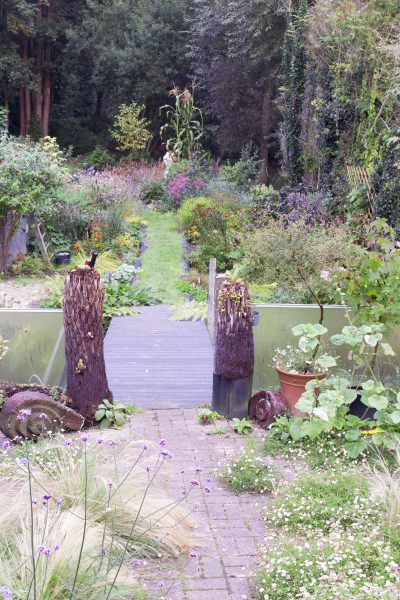
Two dead tree ferns, planted with succulents and self-seeded plants mark off Anna’s terrace from the stream/swampy area beyond.
Anna is currently looking for all sorts of tree stumps, so if you have any you want to get rid of, get in touch (via the Comments or the Contact page here).
Freegle and Freecycle for a really unusual garden…
Freegle and Freecycle are both giveaway sites. If you have something to get rid of, someone may want it. Charity shops often won’t take certain items, such as electricals, for example, or bigger items.
Finding stuff on giveaway sites is somewhat random, but you can sign up to get a regular email. Keep an eye open – you never know what you might find. I had a quick look at a few local groups, and found quite a few old garden tools.
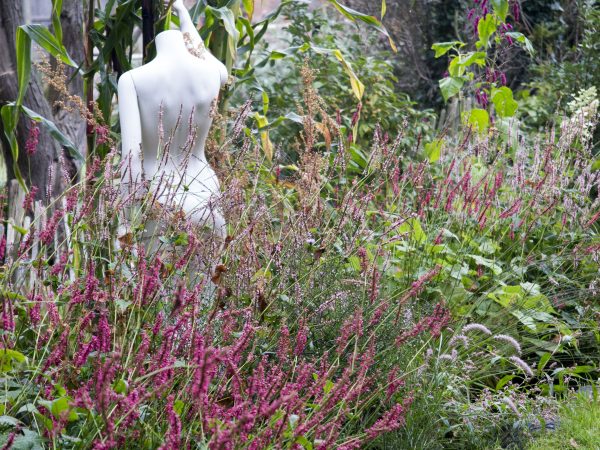
Anna’s latest Freegle acquisition – the mannequins. She collects Persicaria – this one came from a car boot fair, so she can’t remember which one it is. This mannequin is pointing to extra-tall corn which Anna grows in a tractor tyre (‘A tractor tyre holds loads of earth’, she says)
If you have anything to get rid of, it’s worth trying Freegle before taking it to the dump. ‘Don’t throw it away, give it away’ is Freegle’s motto. You sign up to your local group, as people usually come to get their stuff (unlike eBay where you often have to post it).
Freecycle was the original US version, and Freegle started up as a breakaway group in Britain. Many British Freecycle groups migrated to Freegle, but you can use both sites.
Free compost and mulch?
I found a good source of free horse manure on my local Freecycle/Freegle group. We took a couple of spades and lots of bags straight to the stables, and shovelled it in.
However, when you get it directly from the stables rather than packaged, it’s likely to have more weed seeds. I didn’t notice more weeds, but a friend did. Although she is much tidier than I am.
I’ve also got shredded paper from a local accountants to add to my compost.
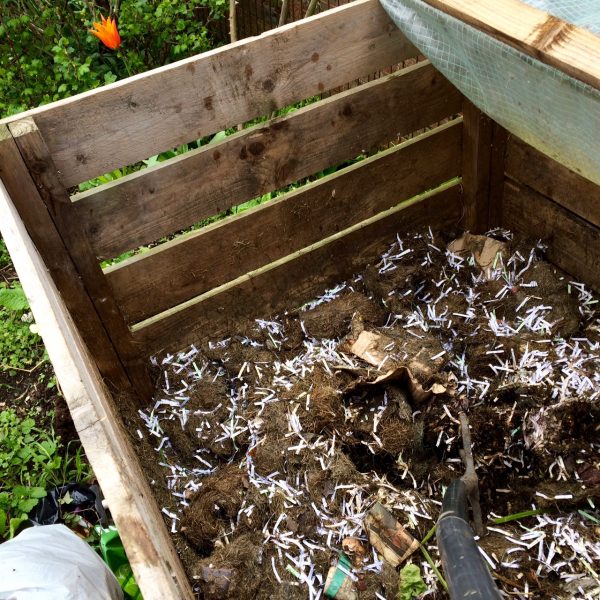
I add shredded paper to the compost when we have alot of lawn clippings. It’s bagged up outside a local accountants, ready for collection, and they’ve said they’re happy for me to take a bag whenever I like.
We live in a part of Kent that still farms hops. They’re happy for Anna to take away hop waste at this time of year. It’ll compost down over the winter.
Think about what farms and industries are in your area. If they have natural waste, they usually have to pay for it to be taken away, so they may let you take some or all of it for free.
Local markets and car boot fairs
Anna and I both live in Faversham, which is becoming well known for its vintage and second-hand markets. Car boot fairs are excellent hunting grounds if you’re creating an unusual garden.
Anna and another friend spotted a box of coat-hangers under a table. ‘We bought the whole box between us,’ said Anna. ‘Friends keep telling me that it’s a good coat-hanger and I shouldn’t be hanging it outside, but I like it there.’

Anna has had the torso for so long, she can’t remember where it came from. The coat-hanger came from Faversham Markets and the ‘A’ literally dropped off an Atkinsons lorry. Anna found it by the side of the road!
Shops or businesses closing down
A few years ago, Anna passed a dress shop that was closing. She asked the owner what she was doing with the fittings: ‘I bought them for very little.’
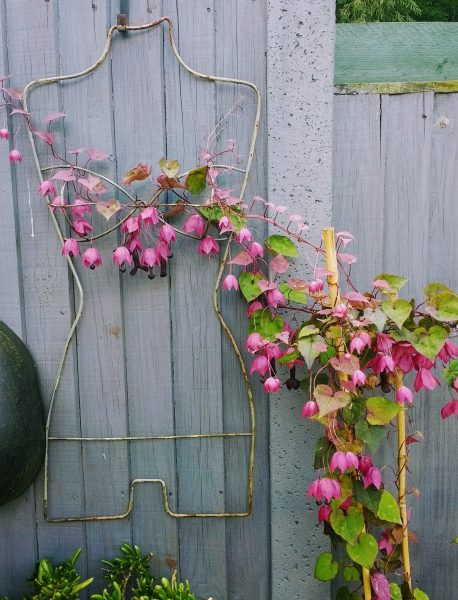
This was a shop fitting from a dress shop. Now it hosts a Rhodochiton atrosanguineus ‘Purple Bells.’
Use one colour paint to bring everything together
Anna has painted her fence, garden shed and anything else relevant the same shade of grey. It really draws everything together. ‘I think grey is a really good garden neutral’, she says.

Paint a fence to make it look better. I love the blue-ish scene here with the leeks. Anna grows leeks from seeds and always grows some extra because leek flowers make wonderful, long-lasting cut flowers.
Plant and seed swaps…
You can google ‘seed swap near me’ or just keep an ear out. Or you can organise a local seed/plant swap yourself (Anna has organised several). There’s good post here from the Lovely Greens blog on how to organise a seed swap.
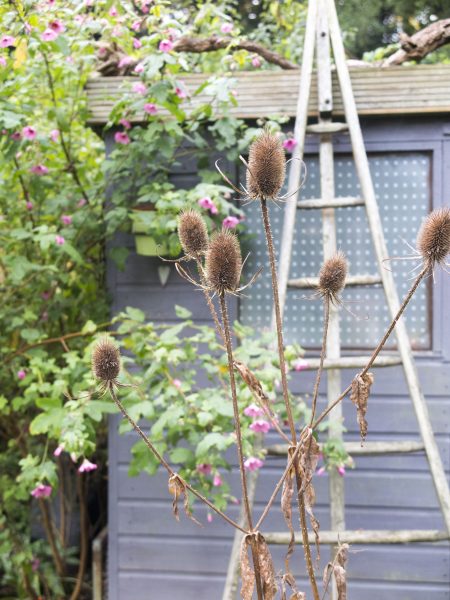
Anna got one teasel from a plant swap. ‘I’ll probably be weeding teasels out of my garden forever, as they can be quite invasive, but I do love them,’ she said.
But swaps aren’t just for seeds…
Anna has run and gone to many plant and seed swaps, so many of her plants are acquired this way. But when she got rid of some surplus furniture to a local vintage furniture dealer, she swapped it for this hop ladder.
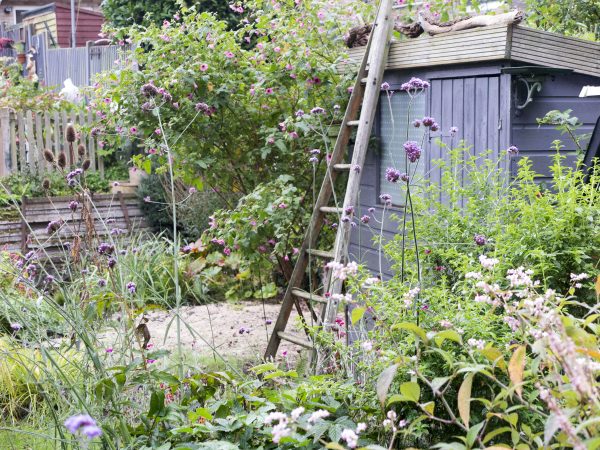
The hop ladder was acquired via a swap. The shed was here when Anna bought the house, but it was in a different position. ‘It took six people to move it,’ she says. It’s painted her signature grey.
If something breaks, use it in the garden
A table with three stone legs broke during Anna’s last move. Now the legs are garden sculptures.
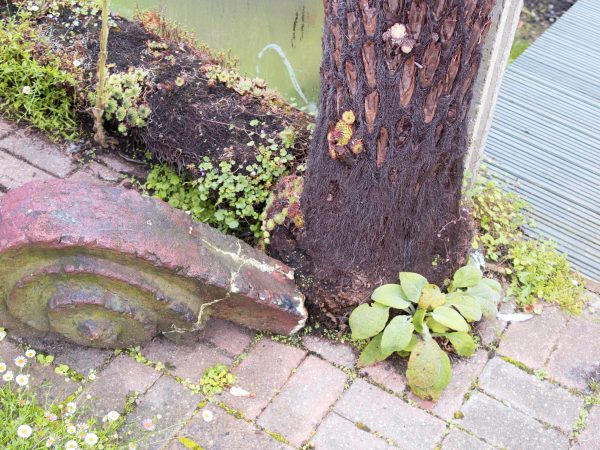
A broken table leg looks a bit like an ammonite. You can see the tree fern trunks close up here. One is upright and the other is lying down.
Serendipity and social media…
This could, perhaps, be re-titled ‘ask and ye shall find.’
Most areas have local Facebook groups where you can swap or share stuff. You can publicise seed or plant swaps on Twitter or Snapchat, and generally find out who’s got what.
Anna doesn’t really use social media, apart from a bit of Twitter. But one day she spotted a beautiful Persicaria orientalis on Twitter. She googled it and discovered that it was quite rare, and only stocked by two nurseries, one of which was out of stock.

Anna’s rare but serendipitous Persicaria orientalis. Spotted on Twitter in the morning, and then given to her by a friend by the evening.
That afternoon, she went to a friend’s house and spotted 24 pots of the same persicaria, waiting to be used for a wedding. They had two spare pots, and gave them to Anna.
When I was clearing out our garage, I found Facebook really useful (as well as Freecycle/Freegle). I posted that I had pallets, a dolls house and various other bits. Once again, people came to collect items. This was a huge help to me, because I was clearing the garage single-handedly and it was packed with some quite large pieces of furniture.
Self-seeders….
Where would an almost-free garden be without self-seeders? Anna brought one Erigeron karvinskianos and one Verbena bonariensis from her former home four years ago.
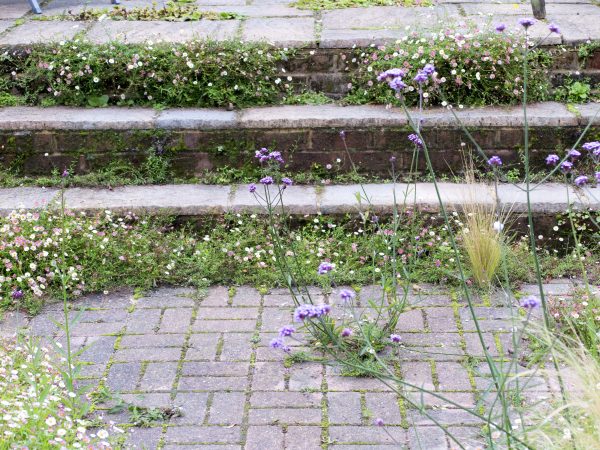
Anna’s terrace is frothing with self-seeded Erigeron karvinskianos and Verbena bonariensis.
Make it yourself…
I think Anna is a bit more handy than I am. But she says that these DIY bat boxes (below) were really easy to make from a pattern from the Kent Bat Group.
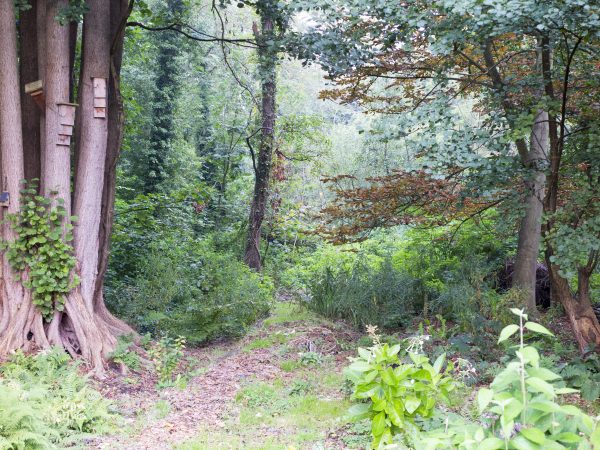
DIY bat boxes hung high in the trees. Bats need to swoop down so don’t have planting below bat boxes. This is the woody end of Anna’s garden – it was once an alder forest to supply charcoal to Faversham’s gunpowder industry. You can see how the trees have been coppiced.
Be patient…
I recently met someone who had just acquired a garden for the first time. She asked me what my top tip for a beginner gardener was.
I told her to take time over getting to know the garden. ‘Just weed and mulch the garden until you really know what you want from it’. I think she thought it was rather a boring tip.
But if you’re trying to save money, you can’t get the garden you want quickly. Even though Anna is an experienced gardener (she’s actually a professional garden designer), it took her four years to get the garden to this state.
Get your eye in…
If you get your plants and accessories from giveaway sites, junk shops, car boot fairs, swaps and markets it will take you a long time to find what you want. In that time, your garden acquires its character and you will get to know it better.
I’ve co-written several fleamarket/junk shop buying books with the stylist Liz Bauwens. They’re all about how to find beautiful things in a pile of junk and how people incorporate them into their homes.
They include Fleamarket Chic, Thrifty Chic and Upcycled Chic & Modern Hacks. Every so often a reader writes to say that when she goes into a junk shop or a flea market, she never sees anything nice.
PS Those are affiliate links, which means I may get a small fee if you buy through them. But I did write them, so I guess that’s fair enough…
The secret is to develop a speciality – such as blue-and-white china, galvanised zinc or pressed glass. And be methodical. Go up and down the shop, the car boot fair or the market from top to bottom, looking out for specific things. If it’s an online giveaway site, read the emails every week. You won’t find something great every time. But you will find some unusual bargains if you persevere.
Happy hunting!
PS Let me know if there are some good sources of free garden stuff I’ve left out!
Pin for reference:
The post How to save lots of money and create an unusual garden appeared first on The Middle-Sized Garden.
from The Middle-Sized Garden http://www.themiddlesizedgarden.co.uk/how-to-save-lots-of-money-and-create-an-unusual-garden/
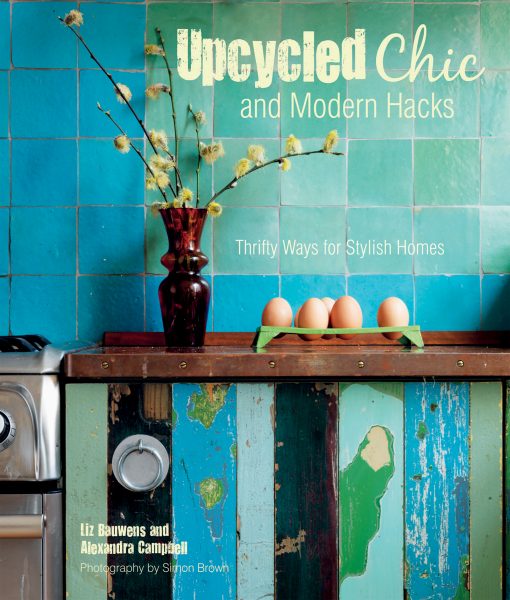

No comments:
Post a Comment